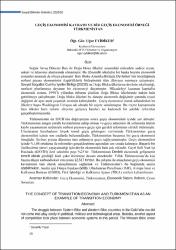| dc.contributor.author | Eyidiker, Uğur | |
| dc.date | 2020-09-03 | |
| dc.date.accessioned | 2020-09-07T10:36:56Z | |
| dc.date.available | 2020-09-07T10:36:56Z | |
| dc.date.issued | 2020-09-03 | |
| dc.identifier.citation | Eyidiker, U. Geçiş Ekonomisi Kavramı ve Bir Geçiş Ekonomisi Örneği Türkmenistan, Sosyal Bilimler Metinleri (Papers on Social Science), Cilt: 2020, Sayı: 1, 2020, s. 13-35. | |
| dc.identifier.uri | https://dergipark.org.tr/tr/pub/sbm/issue/56660/748830 | |
| dc.identifier.uri | https://hdl.handle.net/20.500.11857/1392 | |
| dc.description.abstract | Soğuk Savaş Dönemi Batı ile Doğu bloku ülkeleri arasındaki mücadele sadece siyasi, askeri ve teknoloji alanlarında olmamıştır. Bu dönemde rekabetin bir başka boyutu ekonomik sistemler arasında da ortaya çıkmıştır. Batı Bloku Amerika Birleşik Devletleri’nin öncülüğünde serbest piyasa ekonomisini özgürlüklerle birleştirerek tüm dünyaya sunmaya çalışmıştır. Sovyet Sosyalist Cumhuriyetler Birliği (SSCB) ise Doğu Bloku ülkelerine devletin tekelleştiği, merkezi planlamaya dayanan bir ekonomiyi dayatmıştır. Mücadeleyi kazanan kapitalist ekonomik sistem, 1990’lı yıllardan itibaren çözülen Doğu Bloku ülkelerinde hakim hale getirilmeye çalışılmıştır. Doğu bloku ülkeleri bu süreçte ekonomik değişimin yanında siyasi değişimi de aynı anda yaşamak zorunda kalmışlardır. Geçiş ekonomisi olarak adlandırılan bu ülkelere başta Washington Uzlaşısı adı altında bir reçete sunulmuştur. Bu reçete kapsamında bazı ülkeler hızlı reform sürecine girişmiş bazıları ise kademeli bir şekilde reformlar gerçekleştirmişlerdir. Türkmenistan da SSCB’nin dağılışından sonra geçiş ekonomileri içinde yer almıştır. Türkmenistan zengin yeraltı kaynaklarına sahip olması ve geçiş sürecinin ilk yıllarında üretim kaybı yaşamaması nedeniyle serbest piyasaya geçiş için gerekli reformları sürekli ötelemiştir. Uluslararası kuruluşların birçok temel geçiş göstergesi verilerinde Türkmenistan geçiş ekonomileri içinde son sıralarda bulunmaktadır. Türkmenistan başarısız bir geçiş ekonomisi örneğidir. Serbest piyasa düzenine tam anlamıyla geçiş sağlayamamıştır. Geçiş ekonomileri içinde %1,08 ortalama ile reformları gerçekleştirme açısından son sırada kalmıştır. Başarılı bir özelleştirme süreci yaşayamadığı için devlet ekonomide hala çok etkindir. Gayri Safi Yurt İçi Hasılada (GSYİH) özel sektörün payı %25’tir. Türkmenistan Devleti ekonomik gelişmenin temeli olarak gördüğü fosil yakıt üretimine devam etmektedir. Yıllık Türkmenistan’da kişi başına düşen karbondioksit emisyonu 12,517 tondur. Bu çalışma ile amaçlanan geçiş ekonomisi kavramının tam olarak anlaşılmasını sağlamak ve Türkmenistan’ı bu bağlamda analiz edebilmektir. Analiz için Dünya Bankası (WB), Uluslararası Para Fonu (IMF), Avrupa İmar ve Kalkınma Bankası (EBRD), Türk İşbirliği ve Kalkınma Ajansı (TİKA) verileri kullanılmıştır. | |
| dc.description.abstract | The struggle between Eastern Bloc and Western Bloc countries in the Cold War era did not come into play solely in political, military and technological areas. Besides, another aspect of competition took place between economic systems in this period. The Western Bloc under the leadership of the United States of America endeavored to present free market economy to the entire world by combining it with liberties whilst an economy which was based on central planning and in which the state was monopolized was imposed on Eastern Bloc countries by the Union of the Soviet Socialist Republics (USSR). Attempts were made to make the capitalist economic system, which became victorious in this struggle, dominant in Eastern Bloc countries as of the 1990s. As well as economic transformation in this process, Eastern Bloc countries were forced to have political change at the same time. A prescription initially under the name of the Washington Consensus was offered to these countries which were called as transition economies. In the context of this prescription, some countries entered into a rapid reform process whereas some other countries made reforms in a gradual manner. Following the breakup of the USSR, Turkmenistan was also categorized under transition economies. By virtue of having rich natural resources and not experiencing production losses in the early years of transition, Turkmenistan constantly postponed reforms which were necessary for ensuring the transition to free market. Of transition economies, Turkmenistan ranks at the bottom as per data of several basic transition indicators released by international institutions. Turkmenistan is an example of an unsuccessful transition economy. The country could not get success for the transition to the free market economy system. Thus country is the last one with its 1.08% average in transition economies applying the reforms. The government has still very effective power in the economic system as a result of that unsuccessful customization process. The share of the private sector in the Gross Domestic Product (GDP) is %25. Turkmenistan state continues to fossil fuel production, which is seen as basis of economic development. Annual carbon dioxide emissions per person in Turkmenistan is 12,517 tons. The aim of this study is to assure that the concept of transition economy is fully understood and to analyze Turkmenistan in this context. World Bank (WB), International Monetary Fund (IMF), Europen Bank for Reconstruction and Development (EBRD), Turkish Cooperation and Coordination Agency (TİKA) data have been used for the analysis about Turkmenistan | |
| dc.language.iso | tur | |
| dc.publisher | Tekirdağ Namık Kemal Üniversitesi Sosyal Bilimler Enstitüsü | |
| dc.rights | info:eu-repo/semantics/openAccess | |
| dc.rights.uri | http://creativecommons.org/licenses/by-nc-nd/3.0/us/ | * |
| dc.subject | Geçiş Ekonomisi | |
| dc.subject | Türkmenistan | |
| dc.subject | Ekonomik Sistem | |
| dc.subject | Reform | |
| dc.subject | Çevre Sorunları | |
| dc.subject | Transition Economy | |
| dc.subject | Economic System | |
| dc.subject | Environmental Issues | |
| dc.title | Geçiş Ekonomisi Kavramı ve Bir Geçiş Ekonomisi Örneği Türkmenistan | |
| dc.title.alternative | The Concept of Transition Economy and Turkmenistan as an Example of Transition Economy | |
| dc.type | article | |
| dc.department | Meslek Yüksekokulları, Babaeski Meslek Yüksekokulu, Yönetim ve Organizasyon Bölümü | |
| dc.relation.publicationcategory | [Belirlenecek] | |
| dc.institutionauthor | Eyidiker, Uğur | |





















